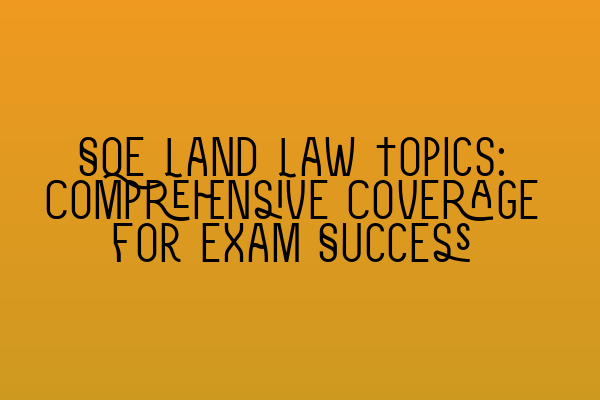SQE Land Law Topics: Comprehensive Coverage for Exam Success
Welcome to SQE Property Law & Land Law, your trusted resource for comprehensive and up-to-date information on land law topics for the Solicitors Qualifying Examination (SQE). Our team of expert solicitors, writers, and SEO professionals is devoted to providing you with the tools and knowledge you need to succeed in your SQE Land Law exam.
Preparing for the SQE Land Law exam can be an overwhelming task, but with the right resources and guidance, you can approach it with confidence. This blog post aims to provide you with a comprehensive overview of the key land law topics that are likely to be tested on the exam.
Introduction to Land Law
Before delving into the specific topics, let’s begin with a brief introduction to land law. Land law is a fundamental area of study for aspiring solicitors, as it deals with the legal rights and interests in land, such as ownership, leases, and easements. Understanding the intricacies of land law is essential for any solicitor practicing in real estate or property law.
1. Freehold and Leasehold Estates
One of the core concepts in land law is the distinction between freehold and leasehold estates. Understanding the differences between these two forms of land ownership is crucial to navigating various legal transactions and disputes. We will explore the characteristics and legal implications of each type, covering topics such as fee simple absolute, determinable fees, and life estates.
2. Registered and Unregistered Land
Another key area of land law is the distinction between registered and unregistered land. In this section, we will delve into the process of land registration, the benefits of registered land, and the issues that may arise with unregistered land. It is essential to have a solid understanding of the Land Registration Act 2002 and the procedures involved in registering and transferring land.
3. Co-Ownership and Trusts
Co-ownership and trusts are critical topics in land law, particularly in situations where multiple individuals share ownership of a property. We will explore the different forms of co-ownership, such as joint tenancy and tenancy in common, and the legal mechanisms for resolving disputes and dividing ownership interests. Understanding the principles of trusts is vital for understanding the fiduciary duties and obligations of co-owners.
4. Easements and Covenants
Easements and covenants are important legal rights and restrictions that can affect landowners and property developers. We will examine the key elements of easements, such as the requirements for creation, scope, and termination. Additionally, we will cover the various types of restrictive and positive covenants, including implied covenants, and their enforceability in land law.
5. Mortgages and Securities
Mortgages and securities play a crucial role in property transactions and financing. Understanding the legal principles governing mortgages is essential for solicitors dealing with real estate transactions. We will explore the characteristics of a mortgage, the rights and obligations of the parties involved, and the remedies available in case of default or foreclosure.
Conclusion
This blog post provides an overview of the key land law topics for the SQE exam. We hope that this comprehensive coverage will assist you in your exam preparation. Remember, practice and review are essential for success, so be sure to check out our related articles and resources:
- SQE 1 Practice Exam Questions
- SQE 1 Practice Mocks FLK1 FLK2
- SQE 2 Preparation Courses
- SQE 1 Preparation Courses
- SRA SQE Exam Dates
At SQE Property Law & Land Law, we are committed to helping you achieve success in your SQE exam. Stay tuned for more informative blog posts, study guides, and practical resources to enhance your understanding of land law topics. Good luck with your exams!
